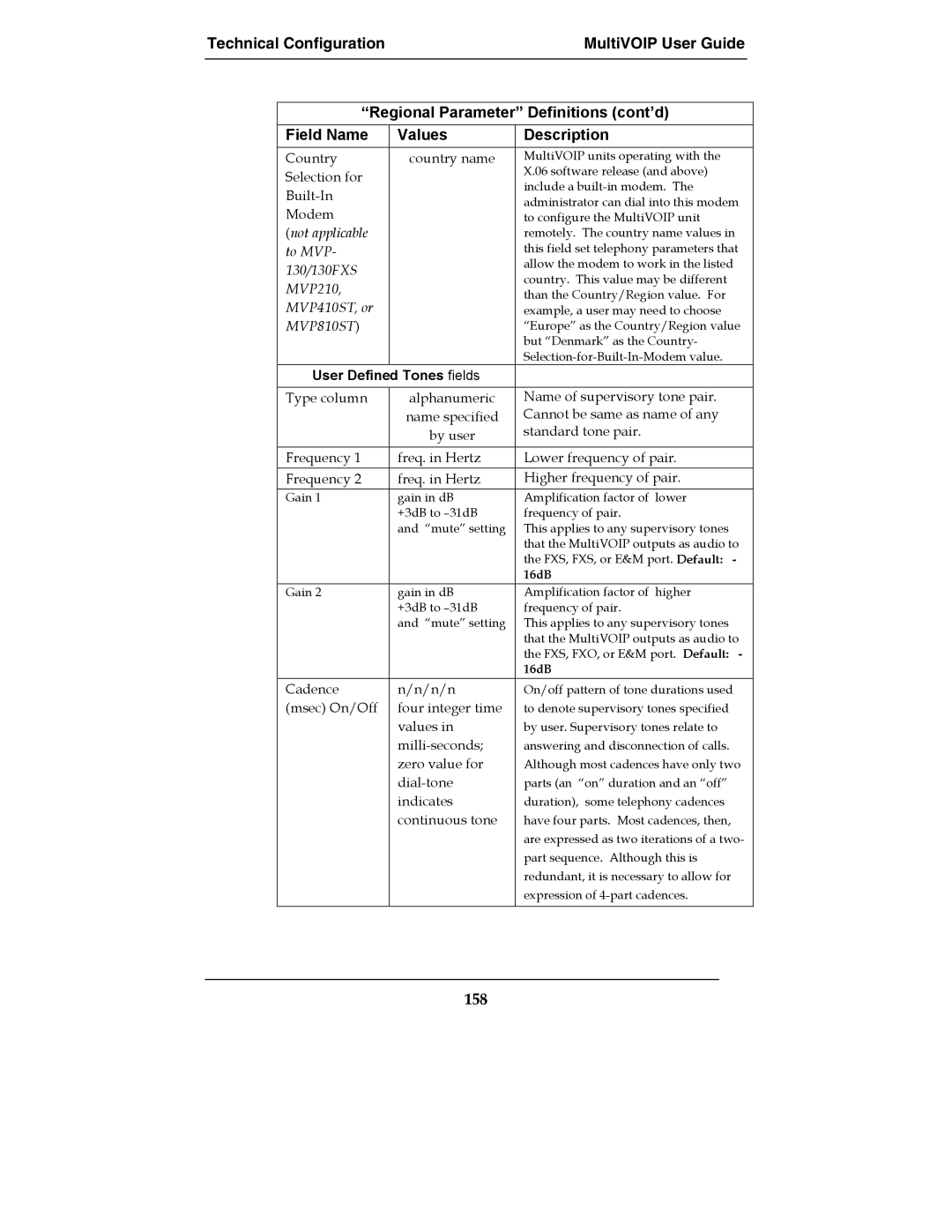Technical Configuration |
| MultiVOIP User Guide |
| |
|
|
|
|
|
|
|
|
|
|
| “Regional Parameter” Definitions (cont’d) |
| ||
| Field Name | Values | Description |
|
| Country | country name | MultiVOIP units operating with the |
|
| Selection for |
| X.06 software release (and above) |
|
|
| include a |
| |
|
|
| ||
|
| administrator can dial into this modem |
| |
| Modem |
|
| |
|
| to configure the MultiVOIP unit |
| |
| (not applicable |
| remotely. The country name values in |
|
| to MVP- |
| this field set telephony parameters that |
|
| 130/130FXS |
| allow the modem to work in the listed |
|
|
| country. This value may be different |
| |
| MVP210, |
|
| |
|
| than the Country/Region value. For |
| |
| MVP410ST, or |
|
| |
|
| example, a user may need to choose |
| |
| MVP810ST) |
| “Europe” as the Country/Region value |
|
|
|
| but “Denmark” as the Country- |
|
|
|
|
| |
| User Defined Tones fields |
|
| |
|
|
|
|
|
| Type column | alphanumeric | Name of supervisory tone pair. |
|
|
| name specified | Cannot be same as name of any |
|
|
| by user | standard tone pair. |
|
|
|
|
|
|
| Frequency 1 | freq. in Hertz | Lower frequency of pair. |
|
| Frequency 2 | freq. in Hertz | Higher frequency of pair. |
|
| Gain 1 | gain in dB | Amplification factor of lower |
|
|
| +3dB to | frequency of pair. |
|
|
| and “mute” setting | This applies to any supervisory tones |
|
|
|
| that the MultiVOIP outputs as audio to |
|
|
|
| the FXS, FXS, or E&M port. Default: - |
|
|
|
| 16dB |
|
| Gain 2 | gain in dB | Amplification factor of higher |
|
|
| +3dB to | frequency of pair. |
|
|
| and “mute” setting | This applies to any supervisory tones |
|
|
|
| that the MultiVOIP outputs as audio to |
|
|
|
| the FXS, FXO, or E&M port. Default: - |
|
|
|
| 16dB |
|
| Cadence | n/n/n/n | On/off pattern of tone durations used |
|
| (msec) On/Off | four integer time | to denote supervisory tones specified |
|
|
| values in | by user. Supervisory tones relate to |
|
|
| answering and disconnection of calls. |
| |
|
| zero value for | Although most cadences have only two |
|
|
| parts (an “on” duration and an “off” |
| |
|
| indicates | duration), some telephony cadences |
|
|
| continuous tone | have four parts. Most cadences, then, |
|
|
|
| are expressed as two iterations of a two- |
|
|
|
| part sequence. Although this is |
|
|
|
| redundant, it is necessary to allow for |
|
|
|
| expression of |
|
|
|
|
|
|
